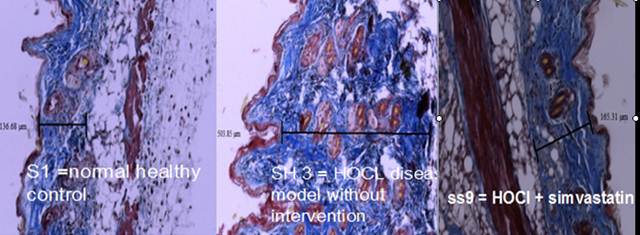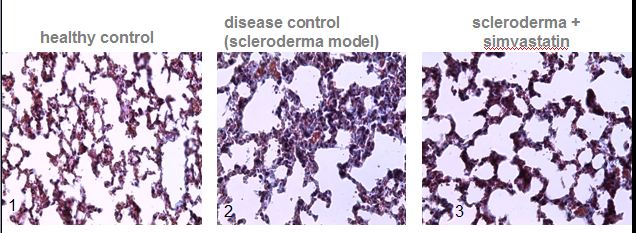Session Information
Title: Systemic Sclerosis, Fibrosing Syndromes and Raynaud’s – Pathogenesis, Animal Models and Genetics
Session Type: Abstract Submissions (ACR)
Background/Purpose: Simvastatin is best known for its antilipidemic action due to its inhibition of 3-hydroxy-3-methylglutaryl CoenzymeA (HMG CoA) reductase. Inhibition of biological precursors in this pathway also enables pleiotrophic immunomodulatory and anti-inflammatory capabilities. The antifibrotic effect of simvastatin has been shown in human lung fibroblasts. This study aimed to measure beneficial effects of simvastatin, and to explore mechanisms of, development of pulmonary fibrosis and skin thickening in a murine model of systemic sclerosis.
Methods: Chronic oxidant stress SSc was induced in BALB/c mice by daily subcutaneous injections of HOCl for 6 weeks as characterized in detail as the Cochin chronic oxidant stress model of SSc (Batteux F, Kavian N, Servettaz A. New insights on chemically induced animal models of systemic sclerosis.Curr Opin Rheumatol. 2011 Nov;23(6):511-8). Mice (n=24) were randomized in three arms: treatment with either simvastatin plus HOCl (n=9): vehicle plus HOCl (n=10), or vehicle alone (n=5). Statin treatment (40 mg/kg) was initiated 30 minutes after HOCl subcutaneous injection and continued daily for the 6 weeks. Skin and lung fibrosis were evaluated by histological methods. The severity of fibrosis was assessed using ordinal or nominal scales in both tissues and the results compared nonparametrically
Results: Injections of HOCl induced cutaneous and lung fibrosis in BALB/c mice as demonstrated by routine histological analysis. Simvastatin treatment both reduced skin thickness by 55% (upper row of 3 representative photomicrographs) and attenuated the histopathological change of HOCl-induced pulmonary fibrosis as shown in the lower series. .,
Conclusion: Simvastatin reduces the development of pulmonary fibrosis potentially modulating adverse lung parenchymal remodeling as shown by the reduced deposition of collagen in alveolar septae in this murine model. Simvastatin also reduces skin thickness in the model. The histological evidence from these experiments suggests that—given the low, 1 per million death rate from statin prescriptions and the morbidity and mortality of SSC pulmonary disease—consideration of human trials is warranted to determine the potential safety and efficacy of simvastatin for treatment of pulmonary fibrosis.
Disclosure:
G. Bagnato,
None;
A. Bitto,
None;
N. Irrera,
None;
G. Pizzino,
None;
D. Sangari,
None;
M. Cinquegrani,
None;
N. Roberts,
None;
G. Bagnato,
None;
F. Squadrito,
None;
A. Saitta,
None.
« Back to 2012 ACR/ARHP Annual Meeting
ACR Meeting Abstracts - https://acrabstracts.org/abstract/simvastatin-attenuates-pulmonary-fibrosis-in-a-murine-model-of-systemic-sclerosis/


